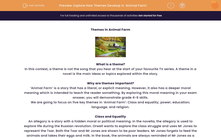Themes in Animal Farm

What is a theme?
In this context, a theme is not the song that you hear at the start of your favourite TV series. A theme in a novel is the main ideas or topics explored within the story.
Why are themes important?
‘Animal Farm’ is a story that has a literal, or explicit meaning. However, it also has a deeper moral meaning which is intended to teach the reader something. By exploring this moral meaning in your exam answer, you will demonstrate grade 4-6 skills.
We are going to focus on five key themes in ‘Animal Farm’: Class and equality; power; education; language, and religion.
Class and Equality
An allegory is a story with a hidden moral or political meaning. In the novella, the allegory is used to explore life during the Russian revolution. Orwell wants to explore the class struggle and uses Mr Jones to represent the Tsar. Both the Tsar and Mr Jones are shown to be poor leaders. Mr Jones forgets to feed the animals and takes their eggs and milk. In the book, the animals are always reminded of Mr Jones as a warning of what they could go back to – being mistreated.

Because of the unfair treatment, the animals revolt against Mr Jones which represents the actions of the communists in 1917. For a while after the revolution, we see equality between the animals while they work together to support the same goal. However, just like Stalin’s leadership in the 1920s, we start to see a class divide again. Instead of Mr Jones or the Tsar at the top of the class system, the pigs are in charge! The rest of the animals are no better off as they are no longer equal.
Exam focus: When the animals are united, they succeed. Consider what Orwell wants us to think of equality and dictators.
Power

In ‘Animal Farm’, Orwell explores the theme of power and control. At the start, the animals gain power over Mr Jones but this is short-lived as the pigs slowly take control. Napoleon is an example of how someone wanting to seize power can affect everyone else. He pretends that the decisions he makes are for the animals, but really they are for selfish reasons. Napoleon steals milk and apples, lies about Snowball and changes the Commandments so that he can do what he wants. We also see power and violence linked closely. For example, Napoleon uses his dogs and guns to intimidate others.
Exam focus: Try to jot down any similarities between Napoleon and Stalin as leaders. What warnings might Orwell be giving the reader?
Through the theme of power, we are also shown what can happen when people do not stand up for themselves. Mollie is an example of this as she cares more about her beauty and ribbons than the rebellion. Boxer also has doubts in the novella but never speaks out about them. Both characters demonstrate to the reader how a dictator can become powerful when people do not oppose them.
Exam focus: Orwell’s message could be that dictatorships are only allowed to succeed if people fail to stand up for their rights. Consider what warning Orwell might be giving the readers about not stepping up against those in power?
Education
Education is important as it is linked with power, the pigs are clever so they become the leaders. Orwell uses education to show how countries try to control people and keep them oppressed.

We see the impact of education through certain characters too. Snowball values education as he wants to improve the lives of all of the animals. He begins to educate them all and tries to teach everyone to read and write as he wants everyone to be able to think for themselves. Napoleon, on the other hand, chooses to focus on educating only the pigs. This means that he is more knowledgeable and important than everyone else, helping him to become a dictator.
Exam focus: What might Orwell’s message be about the importance of education?
Language
Language is important in the novella as it used to manipulate people. This could also be said for how language is used in totalitarian led countries.

Squealer uses language to manipulate as he is head of propaganda. He constantly reminds the animals of Mr Jones which scares the animals and uses statistics that the animals struggle to understand. Napoleon also seeks to reduce language by anyone other than the pigs, "Four legs good, two legs bad” is an example of this. This simple phrase becomes a chant which is used to silence any doubters.
Religion
We can also see elements of religion in ‘Animal Farm’ through the commandments and Sugarcandy Mountain. Religion can be used to give people hope or to control them.

We can see the manipulation of religion through Moses’ description of Sugarcandy Mountain. At the start of the novella, Moses is presented as unreliable. The animals have no interest in his tales as they believe they are creating their own paradise. However, when their life is no better after the revolution, they begin to believe the Sugarcandy Mountain tale as it gives them hope for a better future. This devotion to a better afterlife can be used to change the way people live their lives, as in many religious states across the world. By allowing Moses to spread this story, it could show how powerful regimes use religion to further gain control.
Exam focus: Consider what Orwell’s views of religion might be here. What does he want the reader to feel about Sugarcandy mountain?
Example response:
Note how the student explores the theme of education and makes links to Orwell's message. Try to replicate this in your own response!
Q: How is the theme of education presented in the novella?
A: Orwell uses education to demonstrate how it can be used to exert control or empower people. He uses the character of Snowball as someone the reader could look up to. Snowball encourages all of the animals to be able to read and write. He wants them to have freedom by thinking for themselves. Orwell could be showing us the dangers of others taking control of education. When Napoleon is in charge, he removes education and limits the animals’ ability to think freely. Instead, the reader is left feeling that Snowball would have given them a better life.
So, that's the key five themes covered. In order to help you to secure a good grade, try to explore the theme and link it to the message of the story. This will support your argument and help you to develop a more advanced response!
You should always refer to your own text when working through these examples. These quotations are for reference only.








